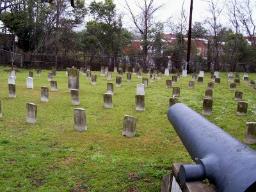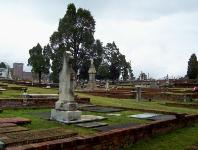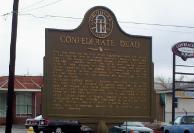Linwood Cemetery
The historic cemetery is the final
resting place for General Henry
"The Rock" Benning. Today's Fort
Benning is named for him.
The historic cemetery is the final
resting place for General Henry
"The Rock" Benning. Today's Fort
Benning is named for him.
The Last Major Battle
Among the graves at Linwood
Cemetery are soldiers killed at
Columbus in the last major battle
of the Civil War.
Among the graves at Linwood
Cemetery are soldiers killed at
Columbus in the last major battle
of the Civil War.
LINWOOD CEMETERY
Columbus, Georgia
Columbus, Georgia
Linwood Cemetery in Columbus, Georgia
| Linwood Cemetery A Civil War cannon aims out over Linwood Cemetery in Columbus, Georgia. Some of the dead are from the last major battle of the Civil War. |
History Written in Stone
Historic Linwood Cemetery was established
in 1828 when Edward Lloyd Thomas, the
man sent by the Georgia General Assembly
to survey the new city of Columbus, selected
the site to bury his young son. Truman
Thomas had accompanied his father into
what was then a vast wilderness, but fell ill
and died in March of 1828.
Although Truman's burial site has been lost
to time, other graves dating from 1829 can
still be seen at Linwood. The oldest official
institution of city government in Columbus,
the cemetery is truly a place where history is
written in stone.
Originally known as the City Cemetery, the
name of the burial ground was changed in
1894 when the surrounding neighborhood
was dubbed Linwood. The name originates
from the popular 19th century novel Ernest
Linwood. Written during the antebellum era
by Caroline Lee Hentz, the book describes
life on the plantations of the Columbus area.
The grave stones at Linwood Cemetery
include some by the most notable American
sculptors of the 19th century. Many of the
carvings are quite remarkable.
Among the individuals buried at Linwood are
some of the most significant people in
Georgia history. Dr. John S. Pemberton, for
example, spent many years as a Columbus
pharmacist before moving to Atlanta where
he made his unique soft drink, Coca-Cola, a
household name.
Some 200 Confederate soldiers are buried
at Linwood. Among these are a sailor who
served aboard the C.S.S. Virginia during her
historic duel with the U.S.S. Monitor. Others
died at hospitals in the city from wounds or
illness. A few of the Southern soldiers buried
here lost their lives during the Battle of
Columbus, the last major battle of the Civil
War.
in 1828 when Edward Lloyd Thomas, the
man sent by the Georgia General Assembly
to survey the new city of Columbus, selected
the site to bury his young son. Truman
Thomas had accompanied his father into
what was then a vast wilderness, but fell ill
and died in March of 1828.
Although Truman's burial site has been lost
to time, other graves dating from 1829 can
still be seen at Linwood. The oldest official
institution of city government in Columbus,
the cemetery is truly a place where history is
written in stone.
Originally known as the City Cemetery, the
name of the burial ground was changed in
1894 when the surrounding neighborhood
was dubbed Linwood. The name originates
from the popular 19th century novel Ernest
Linwood. Written during the antebellum era
by Caroline Lee Hentz, the book describes
life on the plantations of the Columbus area.
The grave stones at Linwood Cemetery
include some by the most notable American
sculptors of the 19th century. Many of the
carvings are quite remarkable.
Among the individuals buried at Linwood are
some of the most significant people in
Georgia history. Dr. John S. Pemberton, for
example, spent many years as a Columbus
pharmacist before moving to Atlanta where
he made his unique soft drink, Coca-Cola, a
household name.
Some 200 Confederate soldiers are buried
at Linwood. Among these are a sailor who
served aboard the C.S.S. Virginia during her
historic duel with the U.S.S. Monitor. Others
died at hospitals in the city from wounds or
illness. A few of the Southern soldiers buried
here lost their lives during the Battle of
Columbus, the last major battle of the Civil
War.
Other burials of note include: Lizzie
Rutherford Ellis, the leader of the group of
Columbus women responsible for
originating Memorial Day; General Henry
Benning, the "Rock" of the Confederacy for
whom Fort Benning is named; James
Warner, the engineer who built the C.S.S.
Jackson at Columbus; H. Augusta Howard, a
leader in the fight to extend the right to vote
for women, and Dr. Francis Orray Ticknor,
writer of the moving Civil War poem, "Little
Giffen."
For more information, please click here to
visit Linwood Cemetery's outstanding and
informative website
Rutherford Ellis, the leader of the group of
Columbus women responsible for
originating Memorial Day; General Henry
Benning, the "Rock" of the Confederacy for
whom Fort Benning is named; James
Warner, the engineer who built the C.S.S.
Jackson at Columbus; H. Augusta Howard, a
leader in the fight to extend the right to vote
for women, and Dr. Francis Orray Ticknor,
writer of the moving Civil War poem, "Little
Giffen."
For more information, please click here to
visit Linwood Cemetery's outstanding and
informative website
CSS Jackson Cannon
An original Brooke rifle from the
Columbus-built ironclad CSS
Jackson is on display at Linwood
Cemetery.
An original Brooke rifle from the
Columbus-built ironclad CSS
Jackson is on display at Linwood
Cemetery.



Battle of Columbus, Georgia
National Civil War Naval Museum
Columbus, Georgia
Historic Sites & Points of Interest
Historic Sites in Georgia
Explore other Southern Historic Sites
National Civil War Naval Museum
Columbus, Georgia
Historic Sites & Points of Interest
Historic Sites in Georgia
Explore other Southern Historic Sites
| Copyright 2011 & 2015 by Dale Cox All rights reserved. Last Updated: April 12, 2015 |

Custom Search


